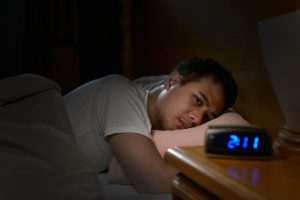
Insomnia means you experience regular problems sleeping, resulting in many symptoms which can be debilitating, leaving you feeling exhausted, physically and mentally fatigued.
What are the symptoms of Insomnia?
If you regularly experience: –
- finding it hard to go to sleep
- waking up numerous times
- lying awake for long periods through the night
- waking up early and being unable to go back to sleep
- feeling tired when you arise, till you go to bed
- finding it hard to even nap during the day, although you feel exhausted
- feeling tired and becoming very irritable throughout the day
- finding it hard to concentrate during the day because of your tiredness.
You may experience these symptoms for months, sometimes years.
Does the above sound familiar, do you have a sleep problem?
Most people may experience problems with sleep at certain times in their lives. It’s a fact that a third of Brits will have episodes of Insomnia at some point.
The causes can vary and could include physical conditions, psychological conditions (such as depression or anxiety) or a combination of both.
On average, the sleep we need:
- adults: 7 to 9 hours
- children: 9 to 13 hours
- toddlers and babies: 12 to 17 hours
If you are constantly tired through the day, you are probably not getting enough sleep.

The most common causes of Insomnia are: –
- illness
- grief
- worry
- stress
- anxiety
- depression
- noise
- temperature of the room
- alcohol, caffeine or nicotine
- recreational drugs like cocaine or ecstasy
- jet lag
- Shift work
These are NHS guidelines to treat Insomnia

Do
- go to bed and wake up at the same time every day – only go to bed when you feel tired
- relax at least 1 hour before bed – for example, take a bath or read a book
- make sure your bedroom is dark and quiet – use thick curtains, blinds, an eye mask or earplugs
- exercise regularly during the day
- make sure your mattress, pillows and covers are comfortable
Don’t
- do not smoke or drink alcohol, tea or coffee at least 6 hours before going to bed
- do not eat a big meal late at night
- do not exercise at least 4 hours before bed
- do not watch television or use devices right before going to bed – the bright light makes you more awake
- do not nap during the day
- do not drive when you feel sleepy
- do not sleep in after a bad night’s sleep – stick to your regular sleeping hours instead
How a pharmacist can help with Insomnia
Providing sleeping aids, such as tablets or medicine. But they will not get rid of your Insomnia and they have many side effects.
Sleeping aids can often make you drowsy the next day. You might find it hard to get things done.
You should not drive the day after taking them.
Treatment from a GP
A GP will attempt to find out what’s causing your Insomnia, so you get the right treatment.
Sometimes you’ll be referred to a therapist and you may be offered CBT
This can help you change the thoughts and behaviours that keep you from sleeping.
GPs now rarely prescribe sleeping pills to treat Insomnia. Sleeping pills can have serious side effects and you can become dependent on them.
Sleeping pills are only prescribed for a few days, or weeks at the most, if:
- your Insomnia is very bad
- other treatments have not worked
It is usually when all else fails I get clients walking through my door, Hypnotherapy is such a fantastic resource and is excellent for most conditions, the mind has all the resources you need and it is my job to help you tap into them, freeing you from the overload that is going on in your life. installing strategies to help you through the rough patch.

Come along and experience for yourself, when you are done with all the rest, come and put Hypnotherapy to the test. You will not be disappointed.

tel- 0191 5801548
